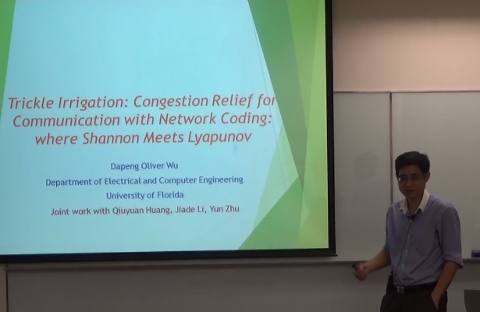
Network coding has been used for error control in communication over lossy channels. However, there do not exist congestion control mechanisms in the literature that are specifically tailored for these coding techniques. In this talk, I will present Trickle, a lightweight and practical framework that is customized to meet the needs of coding. Trickle is designed based on the principle of back pressure, and maintains a novel triple-node indexed queueing structure at each node. As compared to existing back pressure protocols with per-destination or per-link queues, Trickle uses significantly fewer queues, and is more scalable to large networks. Our experimental results have shown that Trickle achieves much higher throughput than existing schemes.
Dapeng Oliver Wu received Ph.D. in Electrical and Computer Engineering from Carnegie Mellon University, Pittsburgh, PA, in 2003. He is a professor at Department of Electrical and Computer Engineering, University of Florida, Gainesville, FL. His research interests are in the areas of networking, communications, video coding, image processing, computer vision, signal processing, and machine learning. He received University of Florida Research Foundation Professorship Award in 2009, AFOSR Young Investigator Program (YIP) Award in 2009, ONR Young Investigator Program (YIP) Award in 2008, NSF CAREER award in 2007, the IEEE Circuits and Systems for Video Technology (CSVT) Transactions Best Paper Award for Year 2001, the Best Paper Award in Globecom 2011, and the Best Paper Award in QShine 2006. Currently, he serves on the editorial board of IEEE Transactions on Signal and Information Processing over Networks and IEEE Signal Processing Magazine. He is the founder of IEEE Transactions on Network Science and Engineering. He was the founding Editor-in-Chief of Journal of Advances in Multimedia between 2006 and 2008, and an Associate Editor for IEEE Transactions on Wireless Communications, IEEE Transactions on Vehicular Technology, and IEEE Transactions on Circuits and Systems for Video Technology. He has served as General Chair for IEEE GlobalSIP 2015, Technical Program Committee (TPC) Chair for IEEE INFOCOM 2012, and TPC Chair for IEEE International Conference on Communications (ICC 2008), Signal Processing for Communications Symposium. He served as Chair for the Award Committee, Technical Committee on Multimedia Communications, IEEE Communications Society. He was elected as a Distinguished Lecturer by IEEE Vehicular Technology Society. He is an IEEE Fellow.
